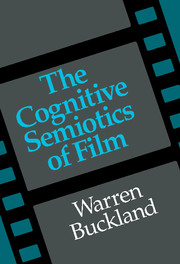Book contents
- Frontmatter
- Contents
- Preface and Acknowledgements
- 1 The Cognitive Turn in Film Theory
- 2 The Body on Screen and in Frame: Film and Cognitive Semantics
- 3 Not What Is Seen through the Window but the Window Itself: Reflexivity, Enunciation, and Film
- 4 The Institutional Context: A Semio-pragmatic Approach to Fiction and Documentary Film
- 5 All in the Mind? The Cognitive Status of Film Grammar
- Conclusion
- Notes
- Bibliography of Works Cited
- Index
4 - The Institutional Context: A Semio-pragmatic Approach to Fiction and Documentary Film
Published online by Cambridge University Press: 02 December 2009
- Frontmatter
- Contents
- Preface and Acknowledgements
- 1 The Cognitive Turn in Film Theory
- 2 The Body on Screen and in Frame: Film and Cognitive Semantics
- 3 Not What Is Seen through the Window but the Window Itself: Reflexivity, Enunciation, and Film
- 4 The Institutional Context: A Semio-pragmatic Approach to Fiction and Documentary Film
- 5 All in the Mind? The Cognitive Status of Film Grammar
- Conclusion
- Notes
- Bibliography of Works Cited
- Index
Summary
I do not think, I no longer think today, that it is interesting to pose the problems of the relations between the immanentist paradigm and the pragmatic paradigm in terms of exclusion or conflict … The consequence of these reflections is that to understand how film is understood necessitates the inclusion of the immanent and pragmatic approaches in the same theoretical framework. As its name indicates, semio-pragmatic attempts to articulate these two paradigms.
(Roger Odin)The most promising [definitions of pragmatics] are the definitions that equate pragmatics with ‘meaning minus semantics’, or with a theory of language understanding that takes context into account, in order to complement the contribution that semantics makes to meaning.
(Stephen Levinson)In conjunction with that of the other cognitive film semioticians I have already discussed in this book, Roger Odin's semio-pragmatic film theory is preoccupied with researching the film spectator's competence, the tacit knowledge that constitutes each spectator's psychic disposition (or mode of attention) when engaged in the activity of watching a film. Odin regards filmic competence as predominantly pragmatic, with the result that meaning is determined, not by the internal, semantic constraints of la langue, or contingent grammatical rules, or by deictic markers, but by a multitude of external constraints.
Odin calls these external constraints ‘institutions’, a concept central not only to pragmatics, but also to sociology and anthropology. For Bronislaw Malinowski, an institution
implies an agreement on a set of traditional values for which human beings come together. […]
- Type
- Chapter
- Information
- The Cognitive Semiotics of Film , pp. 77 - 108Publisher: Cambridge University PressPrint publication year: 2000



